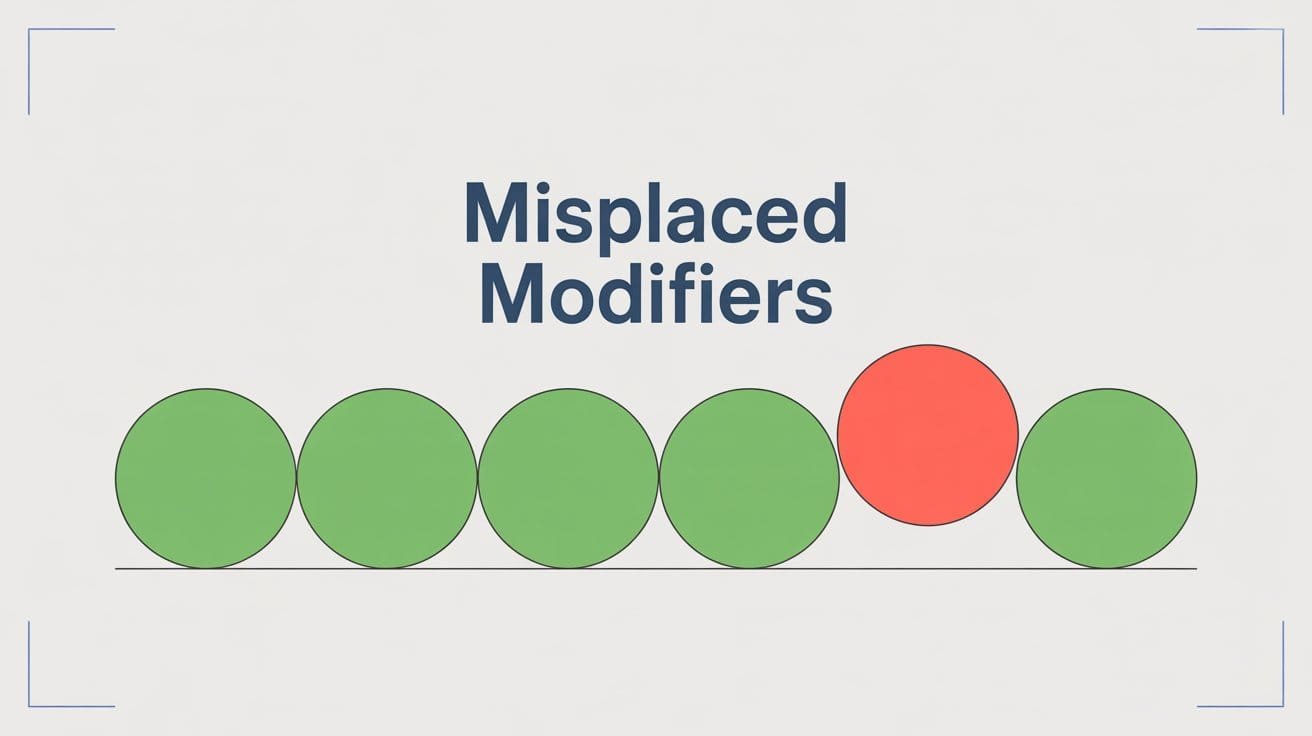A misplaced modifier may look like a small grammar issue, but it can change the meaning of a sentence in unexpected ways. When a modifier is placed too far from the word it describes, the sentence becomes unclear or misleading.
For example, consider this sentence: She served sandwiches to the children on paper plates. Who’s on paper plates: the children or the sandwiches? This kind of confusion is common when modifiers are not placed carefully.
Once you understand how misplaced modifiers work, these errors become easy to recognize and fix.
What Is a Misplaced Modifier?
A misplaced modifier is a word, phrase, or clause that sits too far from the word it describes. Because of that distance, the modifier ends up pointing to the wrong part of the sentence.
When this happens, your sentence still looks grammatical. The problem is meaning. The reader connects the modifier to the nearest logical word, even if that is not what you intended.
Look at this example:
- The student almost finished all her homework.
- The student finished almost all her homework.
In the first sentence, almost modifies finished. This suggests she did not finish the homework at all. In the second sentence, almost is placed next to all her homework, which makes the meaning clear. She completed most of the homework, but not everything.
The words are the same in both sentences. Only the placement changes. That small shift completely changes how the sentence is understood.
Misplaced modifiers often appear when you:
- Add a phrase at the end of a sentence
- Place an adverb without checking what it modifies
- Revise a sentence but forget to adjust word order
Once you train yourself to check modifier placement, these errors become easy to spot and simple to fix.
Why Misplaced Modifiers Change Meaning
Misplaced modifiers change meaning because readers naturally connect a modifier to the nearest logical word. When the modifier is too far away, your sentence points in the wrong direction.
You may know what you intend to say, but the reader only sees the structure on the page. Word order guides interpretation.
Look at this example:
- The researcher discussed the results after the conference with her advisor.
Here, the modifier after the conference appears closer to advisor. This makes it sound as if the advisor came after the conference, not the discussion.
A clearer version fixes the placement:
- After the conference, the researcher discussed the results with her advisor.
Now the modifier clearly explains when the discussion happened.
Misplaced modifiers often cause problems because they:
- Sit closer to the wrong noun or verb
- Appear at the end of long sentences
- Are added during revision without adjusting word order
Even a small shift can change emphasis:
- She only reviewed the final chapter.
- She reviewed only the final chapter.
In the first sentence, only limits what she did. In the second, it limits what she reviewed. The difference comes from placement, not vocabulary.
When you place a modifier next to the word it describes, the sentence becomes easier to read and harder to misunderstand. This habit alone can prevent most misplaced modifier errors.
Common Types of Misplaced Modifiers
Misplaced modifiers appear in a few predictable patterns. Once you recognize these patterns, you can spot the problem quickly and fix it with a small change in word order.
Misplaced Adverbs (Adverb Placement Errors)
Adverbs such as only, just, even, and nearly can easily change meaning when they are placed in the wrong position. Because these adverbs limit or emphasize part of a sentence, their placement matters more than their presence.
Look at this example:
- The analyst even questioned the final results.
- The analyst questioned even the final results.
In the first sentence, even emphasizes the act of questioning. In the second, it emphasizes which results were questioned. The meaning changes because the adverb moves.
Another example:
- The team just approved the proposal yesterday.
- The team approved the proposal just yesterday.
The first sentence sounds vague about timing. The second clearly explains when the approval happened.
When you use a limiting adverb, place it directly next to the word or phrase you want to limit or emphasize. This simple check prevents most adverb-related modifier errors.
Misplaced Phrases
Modifier phrases often cause problems when they sit next to the wrong noun or verb. The reader then attaches the phrase to the closest option, even if that is not what you meant.
Look at this example:
Unclear: She spoke to the professor about the research paper in the hallway.
This placement makes it sound as if the research paper is in the hallway.
Clear: In the hallway, she spoke to the professor about the research paper.
Clear: She spoke to the professor in the hallway about the research paper.
Both revisions make it clear that in the hallway modifies spoke, not research paper.
Another example:
Unclear: The traveler found a wallet walking through the park.
Clear: Walking through the park, the traveler found a wallet.
In the first sentence, the placement makes it sound as if the wallet was walking. In the corrected version, the phrase walking through the park sits next to the noun it actually modifies, the traveler, so the meaning is clear.
A quick way to catch this: after you write a phrase, ask yourself, Which word is it supposed to describe? If the phrase could attach to a different nearby word, move it closer or rewrite the sentence.
Misplaced Clauses
Modifier clauses can cause confusion when they appear too far from the word they describe. Because clauses contain their own subject and verb, the reader expects them to attach clearly to a specific noun.
Look at this example:
Unclear: The company announced a new policy to employees that affects remote work.
The clause appears closest to employees, which makes it sound as if the employees affect remote work.
Clear: The company announced a new policy that affects remote work to employees.
The clause now sits directly next to policy, which is what it describes.
Another example:
Unclear: She shared the report with the manager who was under review.
This placement suggests the manager is under review, which may not be the intended meaning.
Clear: She shared the report that was under review with the manager.
Repositioning the clause removes confusion without adding new words.
How to Fix Misplaced Modifiers
Fixing a misplaced modifier is not about rules. It is about making sure each modifier clearly connects to the word it describes.
Step 1: Identify the Modifier
Start by locating the word, phrase, or clause that adds detail.
Example: The photographer captured portraits of students using expensive cameras.
The phrase using expensive cameras adds detail, but it is not clear who is using them. That uncertainty points to a misplaced modifier.
Step 2: Decide What the Modifier Describes
Ask yourself one question:
Who is actually using the expensive cameras?
If the modifier is meant to describe the photographer, it should be placed next to photographer, not students.
Step 3: Move the Modifier Closer
Reposition the modifier so it sits beside the word it describes.
- Using expensive cameras, the photographer captured portraits of students.
- The photographer using expensive cameras captured portraits of students.
Both revisions remove the confusion by fixing placement.
Step 4: Read for Meaning, Not Sound
A misplaced modifier may sound smooth but still be wrong. Focus on meaning.
- He gave a book to the student about leadership.
- He gave a book about leadership to the student.
The second sentence clearly explains what the book is about.
Step 5: Simplify Long Sentences
Long sentences often hide misplaced modifiers. When that happens, move the modifier forward or shorten the structure.
- The manager discussed the issue with frustration during the meeting that lasted two hours.
- During the two-hour meeting, the manager discussed the issue with frustration.
Reducing distance between the modifier and its target restores clarity.
A Quick Check You Can Use
Before finalizing a sentence, pause and ask:
Could this modifier describe something else by mistake?
If yes, adjust the placement.
Misplaced Modifiers vs Dangling Modifiers
Misplaced modifiers and dangling modifiers both create confusion because the modifier does not connect clearly to the word it describes. The difference lies in whether that word is present in the sentence.
A modifier is misplaced when it appears in the wrong position, even though the word it describes is still in the sentence. The meaning feels off because the modifier points to the wrong noun or verb.
For example,
- The waiter served dessert to the guests covered in chocolate.
- The waiter served dessert covered in chocolate to the guests.
Moving the modifier closer to dessert fixes the meaning without adding new words.
On the other hand, a modifier is dangling when the sentence never states the word the modifier is meant to describe. The modifier is left without a clear subject.
For example,
- Driving through the storm, the power lines were knocked down.
- Driving through the storm, the crew saw that the power lines were knocked down.
Adding the correct subject resolves the problem.
Quick Comparison
| Modifier Type | What Goes Wrong | How You Fix It |
|---|---|---|
| Misplaced modifier | Modifier is too far from the word it describes | Move the modifier closer |
| Dangling modifier | Modifier has no clear subject | Add or clarify the subject |
FAQs About Misplaced Modifiers
What is a misplaced modifier in English grammar?
A misplaced modifier is a word, phrase, or clause that is placed too far from the word it describes. Because of this placement, the modifier appears to describe the wrong part of the sentence, which changes or confuses the meaning.
How do you identify a misplaced modifier?
To identify a misplaced modifier, look for a descriptive word or phrase and ask which word it is describing. If the modifier seems to attach to the wrong word or creates an illogical meaning, it is likely misplaced.
How do you fix a misplaced modifier?
You fix a misplaced modifier by moving it closer to the word it is meant to describe. In some cases, rewriting the sentence makes the meaning clearer without adding extra words.
What is the difference between a misplaced modifier and a dangling modifier?
A misplaced modifier describes the wrong word because of poor placement, but the correct word is still in the sentence. A dangling modifier has no clear word to describe because the sentence is missing the correct subject.
Why are misplaced modifiers a problem in writing?
Misplaced modifiers confuse readers and can change the intended meaning of a sentence. Clear modifier placement improves sentence clarity and helps your writing sound precise and professional.



